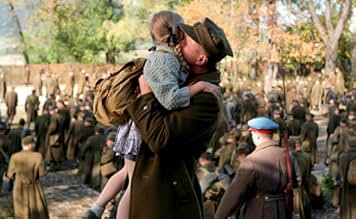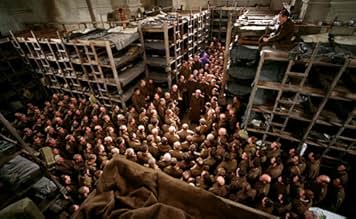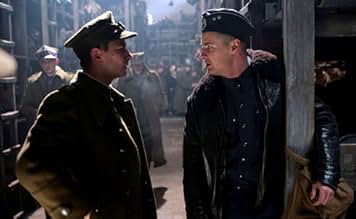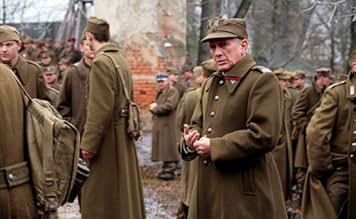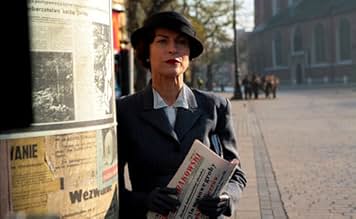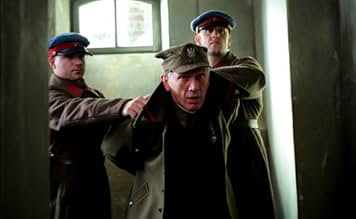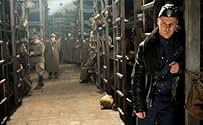VALUTAZIONE IMDb
7,0/10
17.931
LA TUA VALUTAZIONE
Il massacro sovietico di migliaia di ufficiali polacchi e cittadini nella foresta di Katyn nel 1940.Il massacro sovietico di migliaia di ufficiali polacchi e cittadini nella foresta di Katyn nel 1940.Il massacro sovietico di migliaia di ufficiali polacchi e cittadini nella foresta di Katyn nel 1940.
- Regia
- Sceneggiatura
- Star
- Candidato a 1 Oscar
- 14 vittorie e 14 candidature totali
Joachim Paul Assböck
- Obersturmbannführer Bruno Müller
- (as Joachim Assböck)
Recensioni in evidenza
Andrzej Wajda is a brave man. He made "The Man of Marble" and " The Man of Iron" a couple of years before the free trade unions started in Poland. Already in these pictures he attacked the communist system.
This is another variable of that theme. Here it is the Katyn massacre, there Polish officers were executed by the Soviets, who blamed all on the Nazis. And the Polish regime agreed upon it.
Wajda's method, in which he is better than almost anyone else, is showing the endless individual suffering behind the so called world history. Which makes this history more than statistics and analysis.
This is no exception.
This is another variable of that theme. Here it is the Katyn massacre, there Polish officers were executed by the Soviets, who blamed all on the Nazis. And the Polish regime agreed upon it.
Wajda's method, in which he is better than almost anyone else, is showing the endless individual suffering behind the so called world history. Which makes this history more than statistics and analysis.
This is no exception.
KATYN is one of the most powerful World War II films I have ever seen and from the first frame of Poles fleeing from the Germans to the rear and the Russians in the front, an audience immediately feels the horror and claustrophobia of attempting to flee from the enemy, but with a sense of absolutely no where to run. The cast is simply superb, the story one of Polish Officers who meet their fate at the hands of the enemy, but with a sense of pride in themselves and their families, and the men and women who struggled to deal with both the Germans and the Russians and survive, is one written in the annals of history, but now with the truth of the slaughter finally brought to light. The final scenes in KATYN sent me from the theater with a sense of wanting to get a deep breath of air in my lungs, and to attempt to digest the horror I had just seen on the screen. KATYN deserves the Oscar and it is a film that will haunt you forever.
Are there words to express suffering, injustice, hypocrisy of war? May empathy ease the pain of those who lost hope for a better world?
There are many movies on WWII that appear to be more or less captivating, touching as well as educational. And, in this respect, we could easily rate this movie in that way if we treat KATYN as yet another film on WWII. However, the case here is different, more to say exceptionally unique.
Andrzej Wajda, after 18 years since the downfall of communist regime, fulfills the duty he feels to his parents and all Polish Patriots and makes a film on the theme that, not long ago, was not only forbidden to discuss in theater or cinema, but in all public places, the Truth that was prohibited and highly unwelcome, the Truth about the slaughter of more than 20,000 Polish best officers committed by Soviet communists in the forests of Katyn. Andrzej Wajda based his film on Andrzej Mularczyk's story POST MORTEM and consulted great Katyn witnesses, including recently deceased Priest Zdzislaw Peszkowski (1918-2007). If the film is good or weak belongs to the opinions of particular viewers. But lots of people on the premiere day stated that it's a historic work. Why?
KATYN, though a movie, is a wonderful documentary that supplies the viewer with TRUTHFUL information on what really happened in 1940, why it happened and who did this (facts that were most distorted in many historical books and many other sources for years). Here, the truth is more important than anything else. The movie contains archive footage, pictures and terrific narrator. These moments are well balanced and, though appearing several times, do not disturb anything but make for all the rest. And what is the rest?
The rest contains particularly vivid plots of families, their dreams, their fear, husbands/sons' honor, wives' love and care, and foremost young officers' martyrdom. The story of Andrzej (Artur Zmijewski) is exceptionally moving. His situation seems to represent the Poland of that time: torn between two oppressors, two worlds: Nazi Germany who attacked it on September, the 1st, 1939 and communist Russia who attacked it from the east 17 days later. As a victim of Katyn massacre, Andrzej appears to tell us a tragic story of separation, extreme suffering, but hope, to the very last day, the hope for survival. His notebook seems to tell us: "No, I will live, they're taking us somewhere but I'll surely see my beloved woman, my loving mum and my sweet daughter." The tragic though full of hope Christmas Eve also depicts that attitude. Other characters, including Jerzy (Andrzej Chyra), Andrzej's wife Anna (Maja Ostaszewska), General's wife (Danuta Stenka) constitute a brilliant insight into various, usually helpless, reactions towards evil, hypocrisy, injustice, cruelty and neutrality.
These stories are executed in an accurate and universal way. In such historic but tragic content, there is usually a tendency to become either too preachy or too emotional, which, to some extend, jerk the tears from viewers' eyes by force. Wajda does not do anything of these. He remains with the people, with humanity in general, does not give the final answer to anything. He seems to be with all of us and appears to depict a quest for truth, quest for justice and for humanity. Besides, he uses lots of very accurate symbols. The unforgettable and probably most thought provoking symbol is when Andrzej's wife looks for her husband and uncovers the bodies of soldiers. Among them, she occurs to uncover the figure of Christ taken from the Cross in church and laid among the deceased. Haven't we killed God by losing respect for life? Another brilliant symbol is when Russian soldiers tear the Polish flag into two parts, hanging the red part again as the Russian flag and using the white part as a foot dressing.
Except for the factors described above, KATYN is also a wonderful piece of work as a film. Very good cinematography, moody atmosphere, flawless performances. Artur Zmijewski does a brilliant job as Andrzej, Maja Ostaszewska is genuine as his wife and heroic, in a sense, Maja Komorowska is again a real artist in her job giving a real portrayal of the caring and then mourning mother. And Andrzej Chyra as Jerzy whose conscience and solidarity do not allow him to go on...magnificent!
But at the end I must tell you that it was not easy for me to write this review. The stories like this one do not lead to wordy comments, much noise, opinions, praise or criticism. They call for silence, the sacred silence that lets us honor those who died in such inhumane way. This silence shall constitute a significant message for today's generation, shall help us see deeper and give us faith to believe that their lives did not end in the soil. Therefore, though difficult, I consider KATYN one of the most important movies I have seen in my life.
Yes, dear young Patriot, hold Your Rosary high. The world will probably call your act "the act of despair". Yet, the world is befriended with lie and you are now victorious in a world of Glory and Eternal Light where there is no room for "lie". R.I.P.
There are many movies on WWII that appear to be more or less captivating, touching as well as educational. And, in this respect, we could easily rate this movie in that way if we treat KATYN as yet another film on WWII. However, the case here is different, more to say exceptionally unique.
Andrzej Wajda, after 18 years since the downfall of communist regime, fulfills the duty he feels to his parents and all Polish Patriots and makes a film on the theme that, not long ago, was not only forbidden to discuss in theater or cinema, but in all public places, the Truth that was prohibited and highly unwelcome, the Truth about the slaughter of more than 20,000 Polish best officers committed by Soviet communists in the forests of Katyn. Andrzej Wajda based his film on Andrzej Mularczyk's story POST MORTEM and consulted great Katyn witnesses, including recently deceased Priest Zdzislaw Peszkowski (1918-2007). If the film is good or weak belongs to the opinions of particular viewers. But lots of people on the premiere day stated that it's a historic work. Why?
KATYN, though a movie, is a wonderful documentary that supplies the viewer with TRUTHFUL information on what really happened in 1940, why it happened and who did this (facts that were most distorted in many historical books and many other sources for years). Here, the truth is more important than anything else. The movie contains archive footage, pictures and terrific narrator. These moments are well balanced and, though appearing several times, do not disturb anything but make for all the rest. And what is the rest?
The rest contains particularly vivid plots of families, their dreams, their fear, husbands/sons' honor, wives' love and care, and foremost young officers' martyrdom. The story of Andrzej (Artur Zmijewski) is exceptionally moving. His situation seems to represent the Poland of that time: torn between two oppressors, two worlds: Nazi Germany who attacked it on September, the 1st, 1939 and communist Russia who attacked it from the east 17 days later. As a victim of Katyn massacre, Andrzej appears to tell us a tragic story of separation, extreme suffering, but hope, to the very last day, the hope for survival. His notebook seems to tell us: "No, I will live, they're taking us somewhere but I'll surely see my beloved woman, my loving mum and my sweet daughter." The tragic though full of hope Christmas Eve also depicts that attitude. Other characters, including Jerzy (Andrzej Chyra), Andrzej's wife Anna (Maja Ostaszewska), General's wife (Danuta Stenka) constitute a brilliant insight into various, usually helpless, reactions towards evil, hypocrisy, injustice, cruelty and neutrality.
These stories are executed in an accurate and universal way. In such historic but tragic content, there is usually a tendency to become either too preachy or too emotional, which, to some extend, jerk the tears from viewers' eyes by force. Wajda does not do anything of these. He remains with the people, with humanity in general, does not give the final answer to anything. He seems to be with all of us and appears to depict a quest for truth, quest for justice and for humanity. Besides, he uses lots of very accurate symbols. The unforgettable and probably most thought provoking symbol is when Andrzej's wife looks for her husband and uncovers the bodies of soldiers. Among them, she occurs to uncover the figure of Christ taken from the Cross in church and laid among the deceased. Haven't we killed God by losing respect for life? Another brilliant symbol is when Russian soldiers tear the Polish flag into two parts, hanging the red part again as the Russian flag and using the white part as a foot dressing.
Except for the factors described above, KATYN is also a wonderful piece of work as a film. Very good cinematography, moody atmosphere, flawless performances. Artur Zmijewski does a brilliant job as Andrzej, Maja Ostaszewska is genuine as his wife and heroic, in a sense, Maja Komorowska is again a real artist in her job giving a real portrayal of the caring and then mourning mother. And Andrzej Chyra as Jerzy whose conscience and solidarity do not allow him to go on...magnificent!
But at the end I must tell you that it was not easy for me to write this review. The stories like this one do not lead to wordy comments, much noise, opinions, praise or criticism. They call for silence, the sacred silence that lets us honor those who died in such inhumane way. This silence shall constitute a significant message for today's generation, shall help us see deeper and give us faith to believe that their lives did not end in the soil. Therefore, though difficult, I consider KATYN one of the most important movies I have seen in my life.
Yes, dear young Patriot, hold Your Rosary high. The world will probably call your act "the act of despair". Yet, the world is befriended with lie and you are now victorious in a world of Glory and Eternal Light where there is no room for "lie". R.I.P.
FILE THIS ONE UNDER.... "TRUTH IS OFTEN STRANGER THEN FICTION"!
BUT BEFORE DIVING IN: Let us FOCUS on the Title's Content & Context!
KATYN makes it painfully clear that the truth was a very scarce commodity throughout decades of Soviet domination.
Considering Katyn was released nearly 20 years after the end of the Communist/Soviet era in Poland. It seems, to me at least, somewhat baffling that it took Polish film-makers so long to share these tragic and poignant true events with the world. In historical retrospect, Nazi atrocities perpetrated against Poland and its people have been well circulated and repeated tirelessly over past decades.
On the other hand, there has been a virtual dearth of information regarding Soviet atrocities. "WWII was triggered by the German blitzkrieg invasion of Poland in September, 1939." is what we Americans have been told ad nauseam for decades. What is rarely ever mentioned is the simultaneous eastern invasion of Poland by Soviet forces! While Nazi aberrations such as Auschwitz and the Warsaw ghetto have been chronicled in numerous well-known films, this marks the first time, in my recollection at least, that Soviet war crimes have been dealt with openly and clearly in a movie.
KATYN relates this true war time story through the interwoven lives of a dozen or so family members and friends. Within minutes of viewing, I was totally gripped by the story, and even though the eventual outcome is a historical fact we are all keenly aware of, the story unfolded in such a way as to never lose my interest.
ENJOY! / DISFRUTELA!
BUT BEFORE DIVING IN: Let us FOCUS on the Title's Content & Context!
KATYN makes it painfully clear that the truth was a very scarce commodity throughout decades of Soviet domination.
Considering Katyn was released nearly 20 years after the end of the Communist/Soviet era in Poland. It seems, to me at least, somewhat baffling that it took Polish film-makers so long to share these tragic and poignant true events with the world. In historical retrospect, Nazi atrocities perpetrated against Poland and its people have been well circulated and repeated tirelessly over past decades.
On the other hand, there has been a virtual dearth of information regarding Soviet atrocities. "WWII was triggered by the German blitzkrieg invasion of Poland in September, 1939." is what we Americans have been told ad nauseam for decades. What is rarely ever mentioned is the simultaneous eastern invasion of Poland by Soviet forces! While Nazi aberrations such as Auschwitz and the Warsaw ghetto have been chronicled in numerous well-known films, this marks the first time, in my recollection at least, that Soviet war crimes have been dealt with openly and clearly in a movie.
KATYN relates this true war time story through the interwoven lives of a dozen or so family members and friends. Within minutes of viewing, I was totally gripped by the story, and even though the eventual outcome is a historical fact we are all keenly aware of, the story unfolded in such a way as to never lose my interest.
ENJOY! / DISFRUTELA!
An estimated minimum of 3 million Poles were killed by the Stalinist regime; but as Stalin observed "When one person dies it's a tragedy; when a million people die it's a statistic".
The scope of these activities would be considered genocide, if that term was used to describe political and social, as well as racial and religious populations.
So - less "statistically"- mothers, fathers, brothers, sisters, kids, and friends were murdered for the political ends of those who now wish to remain faceless and unknown. It is critical, if we are to emerge as a humane people, that the unknown and faceless multitudes of both victims and their oppressors and killers, be reveled. This movie perhaps, is the first step in that direction.
The scope of these activities would be considered genocide, if that term was used to describe political and social, as well as racial and religious populations.
So - less "statistically"- mothers, fathers, brothers, sisters, kids, and friends were murdered for the political ends of those who now wish to remain faceless and unknown. It is critical, if we are to emerge as a humane people, that the unknown and faceless multitudes of both victims and their oppressors and killers, be reveled. This movie perhaps, is the first step in that direction.
Lo sapevi?
- QuizThe director's father was killed in this massacre. Andrzej Wajda was only 13 years old then. His father's remains were never found.
- BlooperTur says to Ewa, "Haven't you seen that Disney's "The Sleeping Beauty", remember?" That movie was first released fourteen years after 1945, so this may be a mistranslation in the subtitles for "Snow White".
- ConnessioniFeatured in The 80th Annual Academy Awards (2008)
- Colonne sonorePolish Requiem For 4 Solo Voices, Choir And Orchestra
Written by Krzysztof Penderecki
Performed by Polish State Philharmonic Orchestra
I più visti
Accedi per valutare e creare un elenco di titoli salvati per ottenere consigli personalizzati
- How long is Katyn?Powered by Alexa
Dettagli
- Data di uscita
- Paese di origine
- Sito ufficiale
- Lingue
- Celebre anche come
- Катинь
- Luoghi delle riprese
- Aziende produttrici
- Vedi altri crediti dell’azienda su IMDbPro
Botteghino
- Budget
- 4.000.000 € (previsto)
- Lordo Stati Uniti e Canada
- 118.095 USD
- Fine settimana di apertura Stati Uniti e Canada
- 11.053 USD
- 22 feb 2009
- Lordo in tutto il mondo
- 14.768.451 USD
- Tempo di esecuzione2 ore 2 minuti
- Colore
- Mix di suoni
- Proporzioni
- 2.35 : 1
Contribuisci a questa pagina
Suggerisci una modifica o aggiungi i contenuti mancanti


